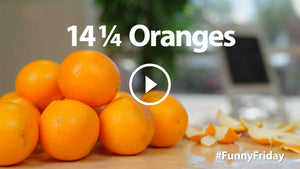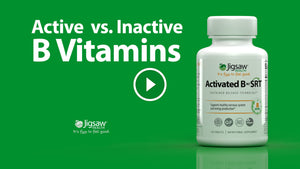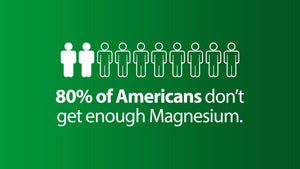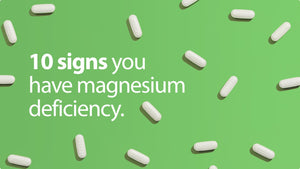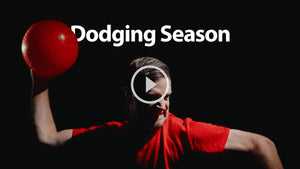Trying a Low Carb Diet or Fasting?
Thomas DeLauer breaks down why minerals are so crucial during low carb diets and fasting on the latest #ScienceSaturday
Make sure you are meeting the RDI 400mg of Magnesium per day with Jigsaw's MagSRT™ – America's #1 Time-Release Magnesium Supplement:
Transcript by Rev.com
- When you're on a ketogenic diet, a low carb diet, or even if you're fasting for that matter, there's some things that you need to be paying attention to and it comes down to your minerals. Now, I mentioned in a lot of videos increasing your sodium intake. In some videos, I talked about magnesium. Some videos, I talked about potassium, but in this video I wanna break it down all into one. I wanna help you understand what happens in your body when you're in a low carb state or when you're in a fasted state and why minerals become extremely, extremely, extremely important.
-So we have to remember that even when we're fasting or when we're cutting carbs out of the diet, we are not holding nearly as much water. You see, for every one gram of carbohydrate that you consume, you hold on average 3.7 grams of water. So that means when you cut these carbohydrates out, your body is losing a lot of water. Now, to make matters worse, ketones like beta-hydroxybutyrate that our body produces when we're fasting or when we're in a ketogenic state are proven to be somewhat of a diuretic as is, so they make it a little bit worse. They cause your body to excrete even more water.
-So let's talk about three minerals today. I wanna talk about sodium, I wanna talk about potassium, and I also wanna talk about magnesium. So let's start with sodium. Here's the thing, first and foremost, when your body isn't holding on to the water as much you're gonna drop some sodium, it's gonna head on out along with the water. You're just going to excrete it out. But there's an additional thing that happens that we have to be cognizant of and that's the fact that your insulin levels are very low. So whether you're fasting or on a ketogenic diet, your insulin levels are lower and insulin helps regulate the kidney's ability to reabsorb sodium. So when insulin isn't present, the kidneys tend to just flush that sodium out of the equation. So now, you have two different things going on, you're losing water because you don't have the carbs and you don't have the actual volume but, then you actually have a function of the kidneys themselves that are causing the body to just excrete extra sodium. This isn't necessarily a bad thing because I will honestly say that the benefits of having lower levels of insulin probably supersede the actual negative aspects of your body excreting sodium. It's a lot easier to add more sodium into the diet.
-So what you're gonna find ends up happening when you're on a ketogenic diet or you're fasting is you might find yourself getting really weak or maybe you get really dizzy when you stand up really quick or maybe you end up having a low blood pressure issue. I work with a lot of people that when they first start going on a ketogenic diet or they're fasting, they get lightheaded, like when they're sitting down and then they stand up, they get really dizzy. What that generally has to do with a low blood pressure issue because you don't have enough sodium, therefore, you're not able to get that blood circulating get it back up to the brain.
-So it's pretty simple. One of the things that I recommend, and I do this in a lot of my videos, I talked about his, you see all my recipes, I'm always adding pink Himalayan salt, is take either pink Himalayan salt, truffle salt, or Brazilian sea salt and add it to your water. All you need to do is add like a quarter to a half teaspoon per day and you're gonna be in good shape. That's gonna help you out a lot. That's gonna help keep the blood volume up and it's gonna make the electrical activity can actually do its thing. You have to remember that our bodies have an electrical system and sodium is going to help muscles contract and it's gonna help nerves communicate with each other so if you don't have that happening because you're on a low carb diet, you're not replacing your sodium, you can really run into an issue and feel rather miserable.
-And as far as sodium is concerned, I at least want to throw a quick study at you so you know I'm not just full of hot air. There's one study that's published in the American Journal of Medicine that took a look at 51 obese patients. Now, these 51 obese patients, they put on a low carb diet. They put them on a 25 carb diet for about six months. They kept their calories still relatively high though, they just cut their carbs down. What they found is at the end of six months, all the patients that were on the low carb diet had an increase in blood urea and nitrogen levels. What does this end up meaning? This means that their body was losing sodium. They also found that their blood levels of sodium were significantly reduced compared to those that didn't go in a low carb diet. So we do have legitimate telltale proof that going on a low carb diet does slow down the ability to retain sodium and it does make it so you lose a little bit of that salt that's helping your blood pressure stay up.
-Okay, now let's move into the next mineral which is going to be potassium. You see, sodium and potassium work together. They work in tandem. They're sort of the same but they're also sort of the opposite. Whereas sodium draws water into the cells, potassium helps water come out of the cells, but if they're out of balance and they can't work together, it throws things off. So what ends up happening is your body doesn't wanna have your system out of balance so when you start losing sodium because of the reasons I mentioned before, your body goes ahead and it expels potassium.
-So think of it like this, you have your kidneys commanding that your body gets rids of sodium but the kidneys don't have an effect on potassium. However, the potassium still communicates with the sodium and finds out that sodium is leaving the body so therefore potassium says "well, I need to leave too, because we need to keep this in balance." So they have such a tight relationship that when the sodium leaves, the potassium decides to leave too all because they're trying to keep the balance there. So now we have low levels of sodium and low levels of potassium.
-So what happens? Well, a lot of times we start adding sodium into the diet but we're not adding potassium so then we're throwing everything off again. The body starts trying to excrete things. I'm making this very very complicated but the general gist of this is that you need to have potassium in the equation. I recommend 99 to 200 milligrams of potassium although I have to say, I'm not a doctor so I can't tell you exactly how much to take. However, it does have a big effect on how you feel. A lot of times when people are fasting or they're doing ketosis, they find they get cramps, they find they don't have the muscle strength that they used to have. And a lot of times, it's simply has to do with the communication between sodium and potassium and those ion pathways that are actually creating the electricity and the energy needed to perform at your best.
-Now it leaves me to my favorite one which is going to be taking in magnesium and you all know I'm a huge fan of Jigsaw's Magnesium SRT and their whole line of magnesium products. But when you are fasting or you're in a ketogenic state, your body is depleted of magnesium just like it is of sodium and potassium. However, we have to make sure that we're getting enough magnesium in because when you are in a ketogenic or fasted state, you have this big increase of catecholamines like norepinephrine and epinephrine that are gonna make you a lot more tense. And since Jigsaw likes to say that magnesium is nature's chill pill, it's definitely something that you wanna have in place when you're fasting or in ketosis. The last thing that you want when you're on a low carb diet, you're already a little bit cranky is feeling like you're tense and feeling like you're cramping up. So you definitely wanna make sure that you're getting that magnesium in the equation too.
-And as always, you can find the best magnesium by clicking on the link and learn a little bit more about Jigsaw's MagSRT and also all the work that we're putting in to make sure that magnesium's on the map. So I will see you there.







